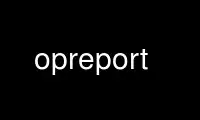
This is the command opreport that can be run in the OnWorks free hosting provider using one of our multiple free online workstations such as Ubuntu Online, Fedora Online, Windows online emulator or MAC OS online emulator
PROGRAM:
NAME
opreport - produce symbol or binary image summaries
SYNOPSIS
opreport [ options ] [profile specification]
DESCRIPTION
opreport outputs binary image summaries, or per-symbol data, from OProfile profiling
sessions. See oprofile(1) for how to write profile specifications.
OPTIONS
--accumulated / -a
Accumulate sample and percentage counts in the symbol list.
--debug-info / -g
Show source file and line for each symbol.
--demangle / -D none|smart|normal
none: no demangling. normal: use default demangler (default) smart: use pattern-
matching to make C++ symbol demangling more readable.
--callgraph / -c
Show call graph information if available.
--details / -d
Show per-instruction details for all selected symbols.
--exclude-dependent / -x
Do not include application-specific images for libraries, kernel modules and the
kernel. This option only makes sense if the profile session used --separate.
--exclude-symbols / -e [symbols]
Exclude all the symbols in the given comma-separated list.
--global-percent / -%
Make all percentages relative to the whole profile.
--help / -? / --usage
Show help message.
--image-path / -p [paths]
Comma-separated list of additional paths to search for binaries. This is needed to
find modules in kernels 2.6 and upwards.
--root / -R [path]
A path to a filesystem to search for additional binaries.
--include-symbols / -i [symbols]
Only include symbols in the given comma-separated list.
--long-filenames / -f
Output full paths instead of basenames.
--merge / -m [lib,cpu,tid,tgid,unitmask,all]
Merge any profiles separated in a --separate session.
--no-header / -n
Don't output a header detailing profiling parameters.
--output-file / -o [file]
Output to the given file instead of stdout.
--reverse-sort / -r
Reverse the sort from the default.
--session-dir=dir_path
Use sample database from the specified directory dir_path instead of the default
location. If --session-dir is not specified, then opreport will search for samples
in <current_dir>/oprofile_data first. If that directory does not exist, the
standard session-dir of /var/lib/oprofile is used.
--show-address / -w
Show each symbol's VMA address.
--sort / -s [vma,sample,symbol,debug,image]
Sort the list of symbols by, respectively, symbol address, number of samples,
symbol name, debug filename and line number, binary image filename.
--symbols / -l
List per-symbol information instead of a binary image summary.
Usually, the total of all per-symbols samples for a given binary image equals the
summary count for the binary image (shown by running opreport with no options).
However, it's possible for some sample addresses to fall outside the range of any
symbols for a given binary image. In such cases, the total number of per-symbols
samples for the binary image may be less than the summary count for the image.
Running opreport with the --verbose=debug option will display an informational
message when this difference is detected. This difference is typically very small
and can be ignored.
--threshold / -t [percentage]
Only output data for symbols that have more than the given percentage of total
samples. For profiles using multiple events, if the threshold is reached for any
event, then all sample data for the symbol is shown.
--verbose / -V [options]
Give verbose debugging output.
--version / -v
Show version.
--xml / -X
Generate XML output.
ENVIRONMENT
No special environment variables are recognized by opreport.
Use opreport online using onworks.net services
